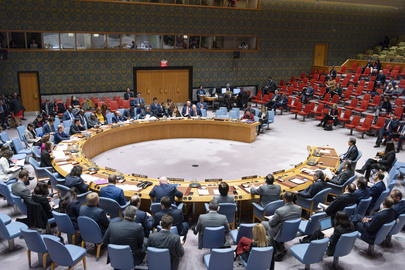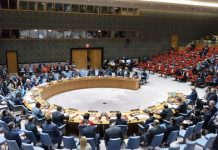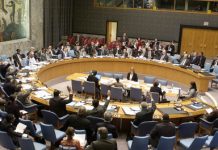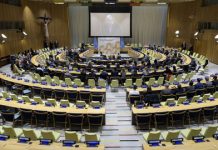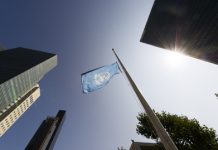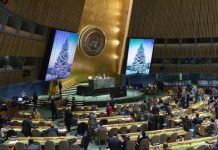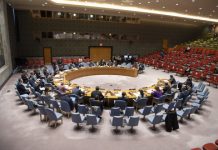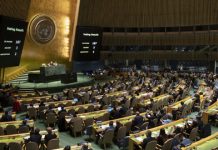UN chief ‘extremely concerned’ over Lebanon escalation
The Secretary-General has said that he’s extremely concerned with the escalation of the conflict in Lebanon and has appealed for an immediate ceasefire, amid what Israel has described as a “limited, localised and targeted” ground operation into Lebanon.
Earlier on Tuesday, António Guterres spoke to Prime Minister Najib Mikati of Lebanon. The UN chief said that an all-out war must be avoided in Lebanon at all costs and that the sovereignty and territorial integrity of Lebanon must be respected.
The UN chief told the Prime Minister that the entire United Nations system in Lebanon is mobilized to assist all those in need in the country, as UN humanitarians launched a $426 million aid appeal in Beirut.
The funding appeal is needed to support one million people uprooted by widespread Israeli shelling.
From the UN aid coordination office, OCHA, spokesperson Jens Laerke described chaotic scenes in Lebanon as people continued to flee airstrikes that have killed more than 1,000 people in the past two weeks alone, according to the UN human rights office, OHCHR.
“We should expect further displacement,” Mr. Laerke told journalists in Geneva:
“We do not have enough supplies, we do not have enough capacity and that’s exactly why we are launching this appeal… As I said, it’s easy to break things and hurt people but getting them back to some sort of normality takes a long time and costs a lot of money.”
In addition to the more than one million people displaced in Lebanon, constant shelling of northern Israel by Hezbollah that began in response to the Israeli war in Gaza has uprooted some 60,000 people in northern Israel.
Meanwhile in Gaza, almost a year since war erupted following Hamas-led terror attacks inside Israel, the UN agency for Palestinian refugees, UNWRA, described enormous needs among civilians.
Spokesperson Louise Wateridge said that Gazans “feel forgotten” and that they continue to need “food, water and shelter”. She said that despairing doctors are unable to save “countless children” in hospitals where there’s an “overwhelming smell of blood”:
“We’re now at 12 months into this war, and I can tell you that 1.9 million people have been displaced. I can tell you that a reported 41,000 people have been killed. I can tell you that 63 per cent of buildings have been damaged or destroyed. But I cannot quantify the horrors that people have endured relentlessly for 12 months.”
Ukrainian prisoners of war tortured at scale by Russian captors, says UN report
To the conflict in Ukraine, where there’s been a sharp increase in the number of non-combatants killed and injured.
According to the UN human rights office, OHCHR, 589 civilians were killed from 1 June to 31 August, a 45 per cent increase on the previous three months.
The deadliest single day was on 8 July when a large-scale coordinated missile attack by the Russian Federation left at least 43 civilians dead. The majority of casualties occurred in territory controlled by Ukraine.
In a new report on the conflict, the UN rights office expressed deep concern at the “widespread and systematic torture and ill-treatment” of prisoners of war by Russia.
Danielle Bell, Head of the UN Human Rights Monitoring Mission in Ukraine, said that hundreds of interviews with Ukrainian prisoners of war released from Russia spoke of torture happening “in multiple facilities”:
“It’s happening on a daily or weekly basis. So, for example, I interviewed, a returned POW about 10 days ago, and he said, a day doesn’t go by without somebody being being beaten.”
Ms. Bell said that Russian prisoners of war in Ukraine had also been subjected to torture or ill-treatment by Ukrainian forces when they were initially captured.
Brazil eliminates elephantiasis as a public health problem
Good news now from Brazil, where the UN World Health Organization (WHO) has reported that the tropical disease lymphatic filariasis – commonly known as elephantiasis – has been eliminated.
The disease causes disfigurement and can disable infected individuals, leaving them vulnerable to social stigma. It is spread by mosquitoes and has afflicted millions worldwide for centuries, WHO said, causing pain and severe swelling.
The head of WHO, Tedros Adhanom Ghebreyesus, welcomed the development and noted that it comes after two decades of work by Brazil to develop a national plan to fight the disease, involving the mass distribution of antiparasitic drugs, vector control activities and strong surveillance, particularly in the most affected areas.
The hope is that other countries will be inspired to tackle lymphatic filariasis and other neglected tropical diseases. Brazil is one of 20 countries that have now eliminated lymphatic filariasis as a public health problem.
In 2023, 657 million people in 39 countries and territories lived in areas vulnerable to the virus.
Daniel Johnson, UN News
Music composed and produced by Joachim Harris. All rights reserved.
Source of original article: United Nations (news.un.org). Photo credit: UN. The content of this article does not necessarily reflect the views or opinion of Global Diaspora News (www.globaldiasporanews.com).
To submit your press release: (https://www.globaldiasporanews.com/pr).
To advertise on Global Diaspora News: (www.globaldiasporanews.com/ads).
Sign up to Global Diaspora News newsletter (https://www.globaldiasporanews.com/newsletter/) to start receiving updates and opportunities directly in your email inbox for free.


